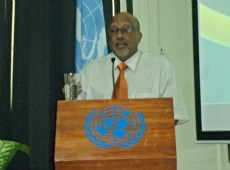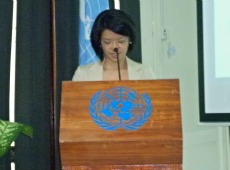The UN’s 2013 global human development report has highlighted inequality and climate change vulnerabilities as major concerns for the Maldives, despite the country’s “significant economic growth” in recent years.
“Although the Maldives’ performance in human development in the South Asian region is quite commendable, the country continues to face a number of risks and vulnerabilities,” said UN Resident Coordinator Tony Lisle during the report’s launch on Sunday (May 12).
The 2013 UN human development report is entitled: “The Rise of the South: Human Progress in a Diverse World”.
The findings have positioned the Maldives in the medium human development category, where it was ranked 104 out of 186 countries and territories. The ranking is based on the human development index – a composite measurement of life expectancy, education, and income.
According to Lisle, the country’s human development index value increased 30 percent between 1995 and 2012, an average annual increase of about 1.6 percent.
The Maldives graduated to the status of a middle income country in Jan 2011.
However, when inequalities are factored into the Maldives’ human development index ranking, the country’s “value falls to 25.2 percent indicating that addressing inequalities continues to warrant significant national attention in the years ahead,” he added.
“Risks and vulnerabilities faced by the Maldives include effects due to climate change and of course the financial global crisis, which is still with us,” said Lisle.
“The nation has also been maturing in its democratic processes, including the creation of independent bodies, the establishment of a multi-party political system, and rolling out of decentralised governance.”
The 2013’s human development report focused on issues such as increasing access to schools, improving access and quality of health services, promoting inclusive growth and putting an emphasis on improving conditions for women globally.
“These are also qualities espoused by the government of Maldives, which deserve our vigorous support,” said Lisle.
To ensure this support, he explained that the Maldivian government was currently collaborating with the UNDP and UN country team to formulate the second national human development report for the Maldives, which will focus on inequality and vulnerability.
“We must go beyond GDP to measure development. The UNDP defines development as a process of enlarging people’s choices to realise their potential and enjoy the freedom to lead lives they value. Some will do better than others with the choices they have, but the challenge is to ensure everyone has a fair and equal chance, equal opportunity to improve quality of life,” said Lisle.
Meanwhile, Vice President Mohamed Waheed Deen, also speaking at the launch, criticised government policy failures for failing to correct numerous development challenges in the Maldives.
Deen therefore emphasised the need to learn from the UN’s latest human development report to address the sustainable development challenges posed by geographically isolated, small island populations.
Women and children suffer
Although Deen proposed “population consolidation” – relocating small island communities to larger landmasses – as a means to improve democratic practices, he also emphasised the benefits of sustainable development.
 He also highlighted the need to listen to communities and young people, while providing them opportunities to express themselves in “forums and different platforms” to utilise their ideas for development and to prevent “wilder activities” from occurring.
He also highlighted the need to listen to communities and young people, while providing them opportunities to express themselves in “forums and different platforms” to utilise their ideas for development and to prevent “wilder activities” from occurring.
“The best method is to let a person express himself or herself and not to hide the real problems of the country, domestic violence, child abuse, and many other issues related to gender. Unless we accept that we have these problems, we cannot bring changes,” Deen said.
“Quite unfortunately we pretended we did not have these problems. We pretended these things never existed in our society. ‘What a wonderful clean society we have’, but the truth is we have these problems and people suffered, children suffered, women suffered,” he lamented.
Deen explained that “sadly” many presidents and politicians have not directly addressed problems within island communities or Maldivian society generally to bring about change. As a result, the recent democratisation process, including the related constitutional changes, have led to protests protests regarding development and human rights issues.
“The only way for our country to progress is to listen to the people. We have learned that the voice of the people must be heard,” Deen stated.
The vice president also discussed the “very important need” to educate the populace about democracy. He stated that it was “almost impossible” to run a democratic nation with “changing constitutions and presidents”.
“The mindset the people must understand what democracy is and how we can sustain it. Unless we do that we won’t be able to sustain a democratic system,” said Deen. “Educating the people is extremely important, more than building harbours.”
Vice President Deen added that economic inequalities have been perpetuated by the lack of planning, job creation for youth, and and a proper tax system.
“We didn’t plan ahead. what has happened to us today, our situation, is not something that has happened overnight. It took time, many years,” he said.
He emphasised the need to establish a “proper tax system” to reduce economic inequalities and bridge the disparity between the wealthy and less fortunate.
“The huge level of discrepancy can create social unrest, misunderstandings, hatred, anger, and frustration and these are bad for any nation,” noted Deen.
“I’m not a believer of expecting donations and support all the time. These funds must be utilized in a context as a catalyst for sustainable development,” he added.
“Please understand the Maldives will never never go back, we will go forward,” Deen declared.
“I hope the presidential candidates seriously consider these [human development] reports when they are deciding their manifestos and bringing changes to our beautiful country,” he added.
UN human development recommendations
Giving her own summary on the 2013 human development report, UNDP Deputy Resident Representative Azusa Kubota said there were four key areas needing to be addressed by governments to facilitate sustainable human development. She said these factors included enhancing equity; enabling voice and participation, managing demographic change and confronting environmental challenges.
 “We all know environmental threats such as climate change, air and water pollution, natural disasters, deforestation affect everyone globally, but they hurt poor countries the most,” Kubota added.
“We all know environmental threats such as climate change, air and water pollution, natural disasters, deforestation affect everyone globally, but they hurt poor countries the most,” Kubota added.
Sustaining human development gains is difficult in the face of “natural disasters which are increasing in frequency and intensity that cause enormous economic damage and loss of human capacities,” she said.
“International governance structures can be held to account, not only by member states but governance by global civil society which is on the rise.”
At the national level, Kuota explained that human development required support by a “developmental state” with an activist government and a political elite that sees record economic growth as their primary aim. She added that job creation and investing in people’s capacities to sustain the gains of economic growth via health, education and other public services were also key elements. Additionally, governments need to actively nurture sectors that would not otherwise emerge to do global competitions and incomplete markets.
Kubota further emphasised that to sustain human development “substantial public investment, in [social services] not just infrastructure, as well as bold proactive, targeted social policies are required. It is not just economic growth alone.
“Human development doesn’t come without targeted policy interventions and carefully crafted national visions,” said Kubota.
The developed north and developing south are connected “more than ever”.
“The challenges faced by the multilateral system in response to the rise of the south [do not pose] a false choice between globalism, regionalism, and sovereignty. We all have to work together. Human development is not a zero sum game, we all benefit equally,” Kubota concluded.
Likes (2)Dislikes
(2)Dislikes (0)
(0) 
 “The high exam pass percentage rate is due to what we did when we were in government,” he claimed. “Before us, there was no target set.”
“The high exam pass percentage rate is due to what we did when we were in government,” he claimed. “Before us, there was no target set.”

